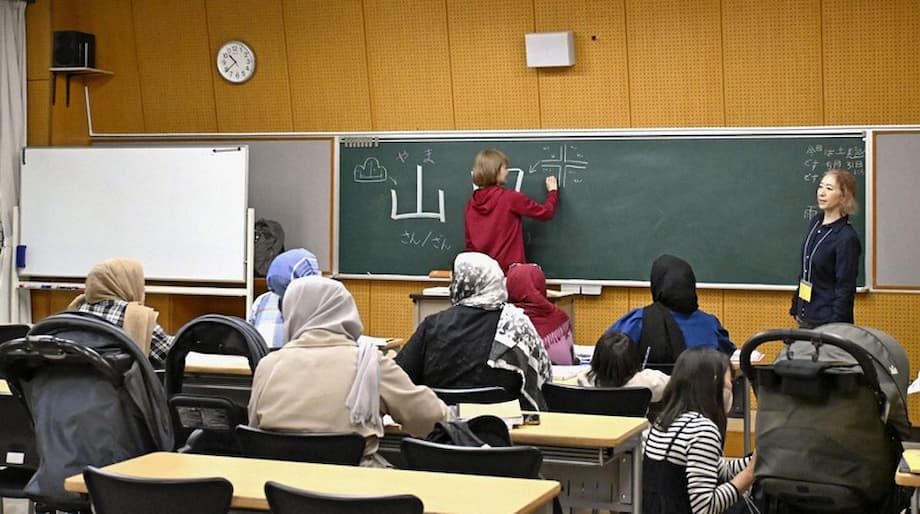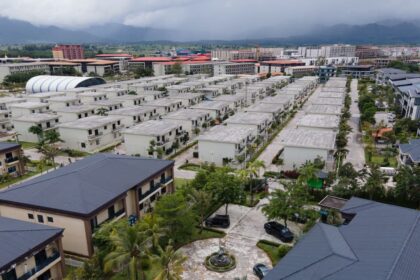Afghan Mothers in Chiba: Overcoming Language Barriers for Their Children’s Future
In the heart of Chiba Prefecture, just outside Tokyo, a quiet revolution is taking place among Afghan women. Far from the headlines of war and displacement, these women are fighting a different battle: the struggle to connect with their children and integrate into Japanese society through language. At the center of this movement is Sedeka Eto, a long-term Afghan resident who has dedicated her life to helping her community overcome the profound challenges of migration and cultural adaptation.
- Afghan Mothers in Chiba: Overcoming Language Barriers for Their Children’s Future
- Why Language Matters: The Afghan Community’s Unique Challenges in Japan
- Voices from the Classroom: Stories of Struggle and Hope
- Integration and Identity: The Broader Afghan Experience in Chiba
- Beyond the Classroom: Afghan Women’s Aspirations and Achievements
- In Summary
For many Afghan mothers in Japan, the language barrier is more than an inconvenience—it is a source of isolation, anxiety, and, at times, family estrangement. As their children quickly adapt to Japanese life and language, mothers often find themselves left behind, unable to communicate effectively with their own families or participate in their children’s education. The free Japanese language school founded by Eto is not just a classroom; it is a lifeline for women determined to reclaim their voices and their roles as mothers and community members.
Why Language Matters: The Afghan Community’s Unique Challenges in Japan
Chiba is home to one of Japan’s largest Afghan communities, with approximately 40 percent of the country’s 6,000 Afghan residents living in the area. Many arrived as refugees following the Taliban’s return to power in 2021, fleeing violence and the loss of basic rights, especially for women and girls. Unlike larger immigrant groups, Afghans in Japan face unique hurdles: a small, tightly-knit community, limited institutional support, and cultural norms that can restrict women’s mobility and independence.
According to academic studies, such as those published in the Wiley Online Library, Afghan communities in Japan tend to cluster in specific neighborhoods, often near workplaces like automobile dismantlers and exporters. This proximity fosters a sense of solidarity but can also reinforce insularity, making integration and language acquisition more difficult for adults—especially women, who may be less likely to work outside the home.
Children, on the other hand, are immersed in Japanese at school and quickly become fluent. This generational language gap can have serious consequences. As Eto explains, “Children learn to speak Japanese at school, but mothers remain unable to understand it. Children then forget the Afghan language.” The result is a growing distance between parents and children, with communication often limited to simple Japanese phrases. Complex issues—like problems at school or emotional struggles—become nearly impossible to discuss.
From Isolation to Empowerment: The Birth of a Language School
Sedeka Eto’s journey from Afghanistan to Japan began in 1983. After marrying a Japanese man and working for nearly four decades as a legal interpreter, she witnessed firsthand the consequences of cultural and linguistic alienation. “I became aware of an increase in shoplifting and other crimes committed by foreign youth,” Eto recalls. She saw a pattern: when parents and children could not communicate, relationships broke down, sometimes leading to juvenile delinquency or even violence at home.
Determined to address these issues, Eto founded the nonprofit Eagle Afghan for the Reconstruction of Afghanistan and, in 2023, opened a free Japanese language school for Afghan women. The school holds classes every Saturday and now has over 120 registered students. For many, it is the highlight of their week—a rare opportunity to learn, socialize, and share their concerns with peers facing similar challenges.
Attending the school is not always easy. Traditional Afghan customs often prohibit women from going out alone, and some husbands oppose their wives’ participation. Yet, many women find ways to attend, sometimes bringing their children or relying on the school’s childcare services staffed by Japanese volunteers. “Despite their husbands’ opposition, the women earnestly study Japanese, stopping what they are doing to focus on their work, even while looking after their children,” Eto says.
Voices from the Classroom: Stories of Struggle and Hope
The impact of the language school is best understood through the stories of the women themselves. One 45-year-old student, who arrived in Japan in December 2022 after fleeing deteriorating conditions in Afghanistan, describes her initial despair: “I felt like I was dead inside because I couldn’t speak Japanese.” Her husband suggested she study with her smartphone, but she found that learning in a classroom, with a teacher and a blackboard, was transformative. “The experience made me happy and improved my mental state,” she says.
Many of the women had to abandon their own education in Afghanistan, where the Taliban has barred girls from attending school beyond a certain age. For them, the chance to study—even as adults—is both a personal victory and a source of empowerment. As one student puts it, “Studying is my favorite thing, and I am grateful to my teachers.”
The benefits extend beyond the classroom. Students report feeling more confident navigating daily life in Japan, from riding public transportation to speaking with teachers at their children’s schools. Some are inspired to pursue further education or seek employment, breaking the cycle of financial dependence on their husbands. “Instead of being financially dependent on their husbands, more and more women have expressed a desire to study further and work outside the home,” Eto observes.
For many, the weekly class is a beacon of hope. “I can’t wait for Saturdays to come,” says one woman. It is a day when they can learn, connect, and momentarily set aside the burdens of housework and cultural expectations.
Integration and Identity: The Broader Afghan Experience in Chiba
The story of Afghan women learning Japanese in Chiba is part of a larger narrative of adaptation and resilience. The Afghan community in Yotsukaido, a city in Chiba Prefecture, has grown steadily since the 1980s, initially drawn by opportunities in the used car export business. Today, the city is home to 1,200 Afghans—about 30 percent of its non-Japanese residents. Restaurants like Arian serve as both culinary and cultural hubs, offering familiar foods and a sense of belonging.
Yet, integration is an ongoing process. Many Afghan adults, especially women, have few opportunities to master Japanese. Local organizations, such as the Cross-Cultural Association in Yotsukaido, offer language classes, including women-only sessions to accommodate religious and cultural needs. Teachers like Atsuko Himeno, affectionately called “sensei,” provide not just instruction but also support for navigating hospitals, schools, and other aspects of Japanese life. “Helping people is my motivation,” Himeno says. “I want them to live without anxieties in Japan, as they already went through tough times in their homelands.”
For children, the situation is different. Immersed in Japanese at school, they often become cultural and linguistic bridges for their families. However, this can also create tension, as parents struggle to keep up with their children’s rapid adaptation. As one mother laments, “My children speak to each other in Japanese, making it impossible for me to understand them.” This generational divide underscores the importance of language education for adults, not just for practical reasons but for maintaining family cohesion and cultural identity.
Other Pathways: Programs and Opportunities for Afghan Learners
The language school in Chiba is not the only initiative supporting Afghan integration in Japan. The Japan-Afghanistan Japanese Language School Pathways (JALP) program, for example, offers Afghan youth the chance to study Japanese in private language schools across the country. Modeled after similar programs for Syrian students, JALP provides tuition, airfare, and support services, helping students prepare for university or employment in Japan. Such programs are vital for young Afghans seeking to rebuild their lives and contribute to their new communities.
Despite these efforts, challenges remain. Japan’s refugee recognition rate is among the lowest in the developed world, and many Afghan evacuees face uncertainty regarding their legal status, employment, and long-term prospects. Academic research highlights the need for more coherent and humane refugee policies, as well as greater support for integration, especially for women and families.
Beyond the Classroom: Afghan Women’s Aspirations and Achievements
The determination of Afghan women in Chiba to learn Japanese and participate in society is mirrored in other success stories. Zakia Khudadadi, for example, made history as the first Afghan woman to compete in the Paralympic Games after a secret evacuation from Kabul. Her journey to Chiba, where she competed in taekwondo, symbolizes the courage and resilience of Afghan women in the face of adversity. Similarly, young Afghans like Mahdi Mirzad, who pursues a boxing career in Japan, demonstrate the community’s diverse aspirations and potential.
These stories highlight the importance of language not just as a tool for survival, but as a gateway to opportunity, self-expression, and belonging. For Afghan women in Chiba, mastering Japanese is about more than words—it is about reclaiming agency, building bridges across generations, and forging a new future in a foreign land.
In Summary
- Afghan women in Chiba, Japan, are overcoming significant language and cultural barriers through a free Japanese language school founded by Sedeka Eto.
- The school addresses the growing communication gap between Afghan mothers and their children, who quickly adapt to Japanese language and culture.
- Traditional norms and limited opportunities make it difficult for Afghan women to attend classes, but many persist, finding empowerment and community.
- Language education is crucial for integration, family cohesion, and access to education and employment opportunities.
- Broader initiatives, such as the JALP program, support Afghan learners, but challenges remain due to restrictive refugee policies and limited institutional support.
- Stories of resilience, such as those of Paralympian Zakia Khudadadi and boxer Mahdi Mirzad, reflect the aspirations and achievements of the Afghan community in Japan.












